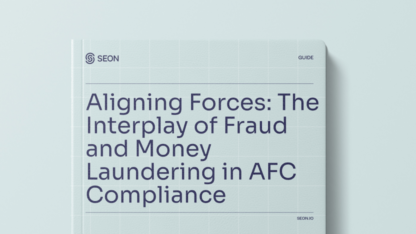As of last year, over 420 million people worldwide use cryptocurrency. As the crypto industry grows, so does the complexity of its financial landscape, making transaction monitoring essential for compliance and risk management.
With the global cryptocurrency market cap exceeding $2.3 trillion, regulatory scrutiny is increasing, pressuring companies to detect and prevent illicit activities like money laundering while staying compliant with global standards. Effective transaction monitoring protects a business’s reputation, safeguards customers, and helps maintain the ecosystem’s integrity.
Why Is Transaction Monitoring Important for Cryptocurrency Firms?
Transaction monitoring is a powerful tool for detecting suspicious activity and potential money laundering attempts. By analyzing transaction patterns, volumes and frequencies, monitoring systems can flag unusual behaviors that may indicate illicit activities, allowing businesses to take prompt action and mitigate risks.
It also ensures compliance with anti-money laundering (AML) and combating the financing of terrorism (CFT) regulations. As global scrutiny of crypto operations increases, businesses must implement strong compliance measures to meet evolving regulations and avoid hefty fines or legal repercussions.
Beyond regulatory compliance, transaction monitoring serves as a shield, protecting businesses and their customers from financial crime. By identifying and preventing fraudulent activities, monitoring systems help foster trust, essential for continued growth and adoption in the space. As a protective functionality, transaction monitoring protects users’ assets and personally identifiable information (PII).
Free up time and resources for better policies, procedures and rules.
Ask an Expert
How It Works for the Crypto Sector
Given the pseudonymous nature of blockchain transactions and the decentralized structure of many crypto networks, transaction monitoring must be tailored to address the unique challenges of the crypto environment. Here’s how transaction monitoring functions in the cryptocurrency sector:
Data Collection and Integration
Crypto transaction monitoring starts by collecting and merging on-chain and off-chain data. On-chain data includes blockchain activity (e.g., wallet addresses, timestamps, and amounts) from networks like Bitcoin and Ethereum. This forms the foundation for understanding transaction histories.
Off-chain data, such as KYC information, IP addresses, and metadata, adds vital context. By linking blockchain activity to real user data, crypto platforms can better assess risk and identify suspicious behavior. This integrated view is essential in the crypto space, where anonymity and decentralization add complexity.
Real-Time Screening and Analysis
After collecting and integrating data, the next step is real-time transaction screening and analysis. In the fast-paced crypto world, immediate monitoring is crucial. Transactions are continuously analyzed using algorithms that assess risk factors like size, frequency, and wallet behavior. Risk scoring helps quantify the level of risk for each transaction, allowing compliance teams to focus on those needing closer scrutiny. This approach improves the speed and accuracy of detecting potential illicit activities in the crypto ecosystem.
Behavioral Analysis
Behavioral analysis is key in crypto transaction monitoring, helping to spot patterns and anomalies that suggest suspicious activity. Monitoring systems detect unusual behavior, like sudden spikes in transactions or the use of services that hide transaction trails, and flag these for further investigation by compliance teams.
The use of multiple blockchain networks adds complexity to this process. Cross-chain analytics allow monitoring systems to track asset movements across different blockchains, crucial for catching illicit activities that involve transferring funds between networks. This ensures suspicious actions are detected even when they span multiple blockchains.
Alerting and Escalation
When a transaction is flagged as potentially suspicious, the monitoring system generates an alert based on predefined risk criteria. These alerts are crucial for drawing attention to transactions requiring further examination. Customizable alerting rules allow businesses to tailor their monitoring systems to specific operational needs, balancing thorough oversight with the efficiency required to handle high transaction volumes. The flexibility in setting these rules ensures the system can adapt to different risk environments and regulatory demands.
Upon generating an alert, the transaction is typically escalated to a human compliance officer for manual review. This step is vital because while automated systems are excellent at identifying risks, the final determination often requires human judgment. Compliance officers examine the flagged transactions in detail, considering additional contextual information and deciding whether the activity warrants reporting to regulatory authorities. This combination of automated alerting and manual review ensures a robust defense against financial crime.
Reporting and Compliance
A key part of transaction monitoring is the obligation to report suspicious activities to authorities. When a transaction appears suspicious, businesses must file a Suspicious Activity Report (SAR), detailing the transaction and the reasons for concern. These reports are crucial for compliance, helping authorities investigate and potentially prosecute financial crimes, while also protecting businesses from regulatory penalties.
Maintaining detailed audit trails is also essential for compliance. Businesses must keep comprehensive records of all transactions and monitoring activities to prove adherence to regulations during audits. These records are critical during inspections, demonstrating the company’s commitment to security and compliance. By combining reporting and audit capabilities, transaction monitoring systems help crypto businesses meet regulatory expectations.
Machine Learning and AI Enhancements
Incorporating machine learning and artificial intelligence (AI) into transaction monitoring systems has significantly enhanced their effectiveness. Machine learning algorithms enable these systems to adapt to new threats by continuously learning from transaction data. Over time, the algorithms refine their ability to detect suspicious patterns, reducing false positives and improving the accuracy of risk assessments. This adaptive capability is especially important in the fast-evolving cryptocurrency landscape, where new types of fraud and money laundering schemes regularly emerge.
AI-driven analytics further enhance transaction monitoring by enabling predictive insights into potential risks. These systems can anticipate suspicious activities before fully developing, allowing businesses to mitigate threats proactively. By integrating AI and machine learning, transaction monitoring systems become more resilient and capable of staying ahead of increasingly sophisticated financial crimes. This not only enhances security but also streamlines compliance efforts, making it easier for crypto businesses to manage their regulatory obligations.
Regulatory Compliance
Staying compliant with global AML and CFT regulations is crucial for crypto businesses. Adhering to standards from bodies like the FATF helps maintain legitimacy by ensuring robust transaction monitoring systems are in place to detect and report suspicious activities, preventing the misuse of crypto for illicit purposes.
As regulations evolve, crypto businesses must update their monitoring systems and ensure staff are trained on the latest requirements. Adapting to these changes is essential to avoid fines and legal issues. A proactive approach to compliance protects businesses from risks and supports the integrity of the global financial system.
Find out how SEON combines technology, data and human insight
Read more about TM
Scaling within the Crypto Space
As the cryptocurrency landscape continues to mature, transaction monitoring will stand as a fundamental pillar of regulatory compliance, risk management, and trust within the digital asset ecosystem. More than just protecting individual businesses, transaction monitoring practices are instrumental in guiding the industry’s future – creating a foundation for broader adoption and integration with traditional financial systems.
Related Articles Around Crypto Fraud
- Cryptocurrency Fraud: What to Know & How to Protect your Exchange
- How to Detect Payment Fraud in Cryptocurrency Exchanges
- FIAT API Reduces Weekly Chargebacks From $40K to $0 with SEON
Sources
- Kroll: Global Enforcement of Anti-Money Laundering Regulation: Shift in Focus
- Europarl: Crypto assets: deal on new rules to stop illicit flows in the EU
- Bloomberg: Robinhood Crypto Unit Fined $30 Million by New York Regulator
Frequently Asked Questions
It’s a system by which automated software uses blockchain technology to securely scan and analyze crypto transactions in real-time. Crypto monitoring platforms should be designed to be compliant with financial regulations and in most cases their performance levels can be enhanced by the presence of humans who manually review its transaction monitoring operations and results.








